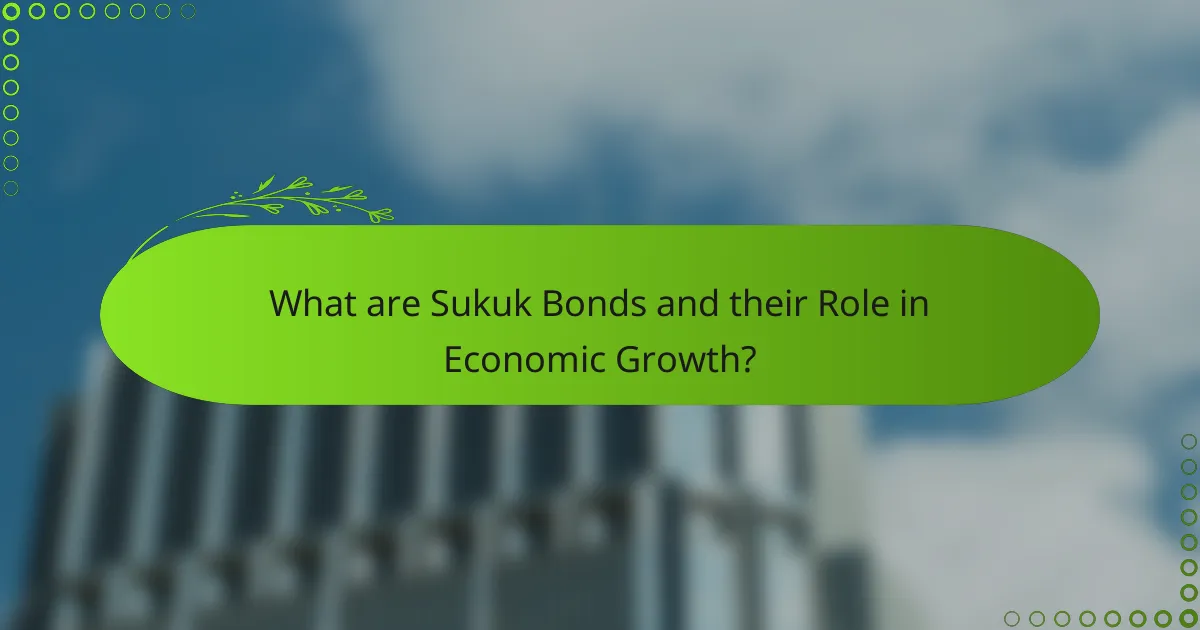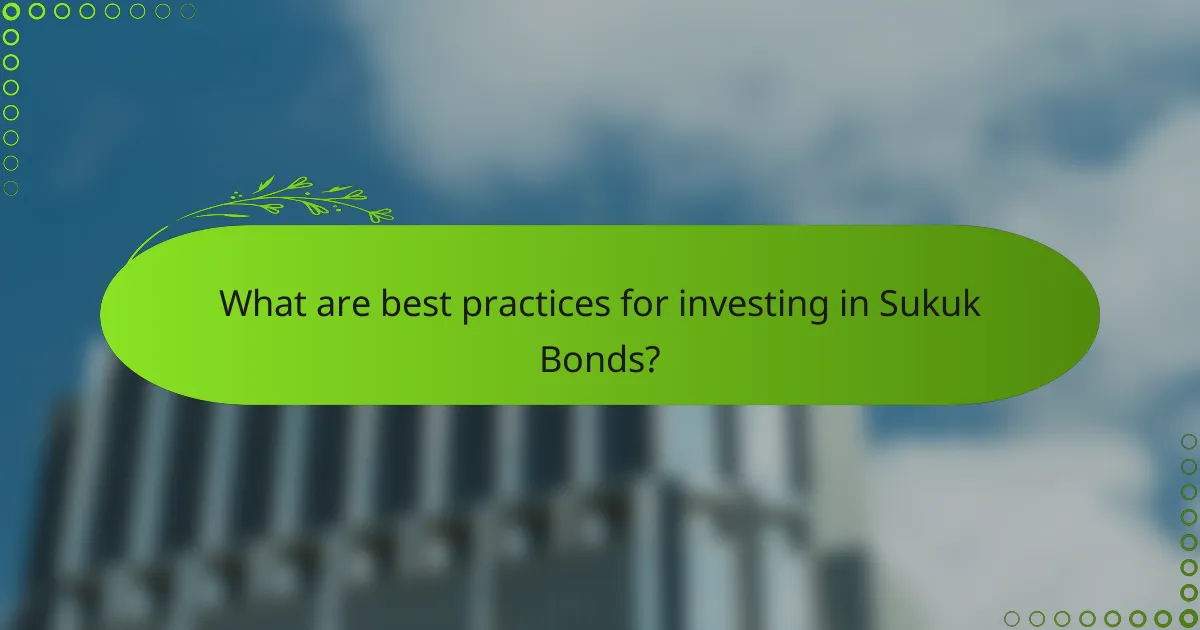
What are Sukuk Bonds and their Role in Economic Growth?
Sukuk bonds are Islamic financial instruments that comply with Sharia law. They represent ownership in a tangible asset or project. Sukuk bonds provide a way for investors to earn returns without engaging in interest-based transactions. They are structured to ensure that returns are derived from the underlying asset’s performance. This structure fosters economic growth by directing funds into productive investments. Sukuk issuance has increased significantly, with global issuances reaching over $200 billion in 2021. The growth of Sukuk bonds supports infrastructure development and job creation. By attracting diverse investors, Sukuk bonds enhance financial inclusion in various economies.
How do Sukuk Bonds differ from traditional bonds?
Sukuk bonds differ from traditional bonds primarily in their compliance with Islamic law. Traditional bonds represent a loan to the issuer, requiring interest payments. In contrast, Sukuk bonds are asset-backed securities that generate returns through profit-sharing or rental income. This structure aligns with the Sharia principle of avoiding interest (riba).
Sukuk bonds must be linked to tangible assets or projects. This requirement ensures that the investment is grounded in real economic activity. Traditional bonds do not have this asset-backed requirement. Additionally, Sukuk holders have ownership rights to the underlying assets, unlike traditional bondholders who are creditors.
These differences reflect the unique principles of Islamic finance, promoting ethical investment. The global Sukuk market has grown significantly, with issuance reaching over $500 billion in recent years. This growth highlights the increasing acceptance of Sukuk bonds as viable financial instruments.
What are the key characteristics of Sukuk Bonds?
Sukuk bonds are Islamic financial certificates that comply with Sharia law. They represent ownership in a tangible asset or project. Sukuk bonds generate returns through profit-sharing rather than interest payments. They provide investors with a steady income stream linked to the underlying asset’s performance. Sukuk bonds can be issued for various purposes, including infrastructure financing and real estate development. They offer diversification benefits to investors by adding non-traditional assets to portfolios. The market for Sukuk bonds has grown significantly, reaching over $500 billion in issuance globally. This growth reflects increasing demand for Sharia-compliant investment options.
Why are Sukuk Bonds considered Sharia-compliant?
Sukuk bonds are considered Sharia-compliant because they adhere to Islamic law principles. These bonds represent ownership in tangible assets or projects rather than debt. Sharia prohibits interest (riba), and Sukuk structures avoid this by providing returns through asset leasing or profit-sharing. Each Sukuk must be backed by real economic activity, ensuring that funds are used for ethical investments. This adherence to ethical financing aligns with Islamic finance principles. Additionally, the issuance of Sukuk is often overseen by Sharia scholars to ensure compliance. Thus, Sukuk bonds provide a legitimate investment avenue within Islamic finance frameworks.
What are the main benefits of Sukuk Bonds for economic growth?
Sukuk bonds promote economic growth by providing alternative financing options. They attract investment from both local and international markets. This influx of capital can fund infrastructure projects, which are essential for economic development. Sukuk bonds also comply with Islamic finance principles, appealing to a broader investor base. The issuance of Sukuk can enhance liquidity in financial markets. Additionally, they can help diversify funding sources for governments and corporations. In 2020, global Sukuk issuance reached approximately $150 billion, demonstrating their growing importance in financial markets. Thus, Sukuk bonds contribute significantly to economic growth through increased investment and diversified financing.
How do Sukuk Bonds enhance liquidity in financial markets?
Sukuk bonds enhance liquidity in financial markets by providing tradable financial instruments. They allow investors to buy and sell these bonds in secondary markets. This trading activity increases market participation and facilitates capital flow. Sukuk bonds are structured to comply with Islamic finance principles, attracting a diverse investor base. Their unique characteristics, such as asset backing, contribute to investor confidence. Increased confidence leads to higher trading volumes. Higher trading volumes improve overall market liquidity. Studies indicate that markets with active Sukuk trading exhibit greater liquidity levels compared to those without.
What impact do Sukuk Bonds have on infrastructure development?
Sukuk bonds significantly impact infrastructure development by providing a Sharia-compliant funding mechanism. They mobilize capital for large-scale projects, such as roads, bridges, and public utilities. This financing method attracts both local and international investors. Sukuk bonds often have lower costs compared to conventional loans. They also enhance liquidity in financial markets. In 2020, global Sukuk issuance reached approximately $140 billion, indicating strong market interest. Moreover, infrastructure projects funded by Sukuk can stimulate economic growth and job creation. This funding approach aligns with sustainable development goals, promoting social and economic benefits.
How do Sukuk Bonds promote financial inclusion?
Sukuk bonds promote financial inclusion by providing access to capital for underserved communities. They enable investment in projects that benefit these communities, such as infrastructure and social services. Sukuk bonds are structured to comply with Islamic law, attracting investors who prioritize ethical financing. This broadens the investor base beyond traditional financial markets. Additionally, Sukuk bonds can be issued in smaller denominations. This allows individuals with limited resources to participate in investment opportunities. According to a report by the Islamic Development Bank, Sukuk financing has supported over 500 projects in various sectors. These projects have had a significant positive impact on local economies and communities.
What role do Sukuk Bonds play in attracting foreign investment?
Sukuk bonds play a significant role in attracting foreign investment by offering Sharia-compliant financial instruments. These bonds appeal to a wide range of investors who seek ethical investment opportunities. Sukuk bonds provide a stable return on investment, which is attractive in volatile markets. They also enhance liquidity in the financial markets of issuing countries. In 2020, global Sukuk issuance reached $200 billion, demonstrating strong demand. Countries like Malaysia and the UAE have successfully used Sukuk to draw foreign capital. This influx of investment supports infrastructure development and economic growth. The transparent nature of Sukuk structures further builds investor confidence.
How can Sukuk Bonds support small and medium enterprises (SMEs)?
Sukuk bonds can support small and medium enterprises (SMEs) by providing them access to capital. SMEs often face challenges in securing financing through traditional banking methods. Sukuk bonds offer a Sharia-compliant alternative that attracts diverse investors. This financing method allows SMEs to fund their projects without incurring interest, aligning with Islamic finance principles.
Additionally, Sukuk bonds can enhance liquidity for SMEs, enabling them to manage cash flow effectively. A report from the Islamic Financial Services Board indicates that Sukuk issuance has increased significantly, promoting financial inclusion for SMEs. This growth in Sukuk can lead to more investment in the SME sector, fostering innovation and economic development.

What challenges exist in the Sukuk Bond market?
The Sukuk Bond market faces several challenges. One major challenge is regulatory inconsistency across different jurisdictions. This inconsistency can create confusion for investors and issuers. Another challenge is the limited liquidity in the secondary market. Low trading volumes can hinder the ability to buy or sell Sukuk bonds easily. Additionally, there is a lack of standardization in Sukuk structures. This can lead to difficulties in valuation and comparison among different Sukuk offerings. Furthermore, the market often experiences a shortage of skilled professionals. This shortage can affect the quality of Sukuk offerings and investor confidence. Lastly, geopolitical risks can impact investor sentiment and market stability. These challenges collectively affect the growth and acceptance of Sukuk bonds in the global financial landscape.
How can regulatory frameworks affect Sukuk Bonds?
Regulatory frameworks can significantly affect Sukuk bonds by influencing their issuance, compliance, and marketability. These frameworks establish the legal parameters within which Sukuk must operate. For example, they dictate the structures that can be used, such as Ijara or Murabaha. Compliance with Sharia law is also essential, and regulations ensure adherence to these principles. Furthermore, regulatory clarity can enhance investor confidence. This, in turn, can lead to increased demand and liquidity in the Sukuk market. Countries with supportive regulatory environments tend to see more robust Sukuk issuance. A study by the Islamic Financial Services Board highlights that regulatory support is crucial for the growth of Sukuk markets.
What are the common misconceptions about Sukuk Bonds?
Common misconceptions about Sukuk Bonds include the belief that they are similar to conventional bonds. Sukuk Bonds are structured to comply with Islamic law, which prohibits interest. Many think Sukuk Bonds do not provide returns. In reality, they generate income through profit-sharing or asset leasing. Some believe Sukuk Bonds are risky. However, they often involve underlying assets, providing a level of security. Another misconception is that only Muslims can invest in Sukuk Bonds. In fact, they are open to all investors seeking ethical investment options. Lastly, some think Sukuk Bonds lack liquidity. Many Sukuk Bonds are traded on established exchanges, enhancing their liquidity.
What innovations are emerging within the Sukuk Bond market?
Innovations emerging within the Sukuk Bond market include the introduction of green Sukuk. Green Sukuk are specifically designed to fund environmentally sustainable projects. These bonds attract socially responsible investors. Another innovation is the development of digital Sukuk. Digital Sukuk utilize blockchain technology for enhanced transparency and efficiency. This technology streamlines the issuance process and reduces costs. Additionally, hybrid Sukuk are gaining traction. Hybrid Sukuk combine features of both conventional bonds and Islamic finance. These innovations reflect a growing diversification in the Sukuk market. They aim to meet the evolving needs of investors and issuers alike.
How is technology influencing the issuance of Sukuk Bonds?
Technology is significantly influencing the issuance of Sukuk Bonds by enhancing efficiency and transparency. Digital platforms streamline the issuance process. These platforms reduce time and costs associated with traditional issuance methods. Blockchain technology ensures secure and transparent transactions. It increases trust among investors and issuers. Smart contracts automate compliance and execution of Sukuk terms. This innovation minimizes human error and enhances reliability. Furthermore, data analytics provides insights into market trends, helping issuers tailor offerings. Overall, technology transforms Sukuk issuance into a more accessible and efficient process.
What new structures are being developed in Sukuk financing?
New structures in Sukuk financing include green Sukuk, social Sukuk, and sustainability-linked Sukuk. Green Sukuk focus on financing environmentally friendly projects. Social Sukuk aim to fund social development initiatives. Sustainability-linked Sukuk tie financial performance to sustainability targets. These structures reflect a growing trend towards responsible investment. They cater to investors seeking ethical investment opportunities. The development of these structures supports economic growth through innovative financing solutions.

What are best practices for investing in Sukuk Bonds?
Investing in Sukuk bonds requires careful consideration of several best practices. First, conduct thorough research on the issuer’s creditworthiness. This includes analyzing financial statements and understanding their business model. Second, diversify your Sukuk investments across different sectors and issuers. Diversification mitigates risk and enhances potential returns. Third, understand the structure and terms of the Sukuk. Different Sukuk types may have varying levels of risk and return profiles. Fourth, monitor market conditions and interest rates. Changes in these factors can affect Sukuk performance. Fifth, consider the regulatory environment. Ensure compliance with Sharia principles and local regulations. Lastly, consult with financial advisors who specialize in Islamic finance. Their expertise can provide valuable insights and guidance for making informed investment decisions.
How should investors assess the risks associated with Sukuk Bonds?
Investors should assess the risks associated with Sukuk Bonds by analyzing credit risk, market risk, and liquidity risk. Credit risk involves evaluating the issuer’s ability to meet payment obligations. Investors can review the issuer’s financial statements and credit ratings. Market risk refers to fluctuations in Sukuk values due to changes in interest rates or economic conditions. Historical data on Sukuk performance can provide insights into market trends. Liquidity risk pertains to the ease of buying or selling Sukuk in the market. Investors should consider trading volumes and market demand for specific Sukuk issues. Understanding these risks helps investors make informed decisions regarding their Sukuk investments.
What factors should be considered when choosing Sukuk Bonds?
When choosing Sukuk Bonds, consider the underlying asset and its compliance with Shariah law. The asset should be tangible and contribute to economic activity. Evaluate the credit rating of the issuer to assess default risk. Analyze the expected return on investment compared to conventional bonds. Consider the liquidity of the Sukuk, as some may have limited trading options. Review the duration of the bond, as it affects exposure to interest rate changes. Assess the legal framework governing the Sukuk to ensure investor protection. Finally, consider the market demand for Sukuk bonds, as this can influence pricing and resale value.
What strategies can enhance the effectiveness of Sukuk Bonds for economic growth?
Enhancing the effectiveness of Sukuk Bonds for economic growth can be achieved through several strategies. First, improving regulatory frameworks can foster investor confidence. Clear guidelines and standards will attract more participants in the Sukuk market. Second, increasing awareness and education about Sukuk can broaden the investor base. This can lead to higher demand and liquidity in the market. Third, promoting Sukuk as a viable alternative to conventional bonds can diversify funding sources for infrastructure projects. Research indicates that countries utilizing Sukuk for financing have seen significant economic development. For instance, Malaysia has successfully issued Sukuk for infrastructure, resulting in enhanced public services and job creation. These strategies collectively contribute to the overall growth and stability of economies utilizing Sukuk Bonds.
How can collaboration between governments and issuers improve Sukuk outcomes?
Collaboration between governments and issuers can significantly improve Sukuk outcomes. This partnership enhances regulatory frameworks that support Sukuk issuance. Governments can provide guarantees, reducing investment risks and attracting more investors. Issuers benefit from streamlined processes and clearer guidelines, promoting efficiency in Sukuk structuring. Joint efforts in marketing Sukuk can increase awareness and demand in the market. Furthermore, governments can facilitate liquidity through secondary market development, enhancing Sukuk’s attractiveness. Successful collaborations have been observed in countries like Malaysia, where government initiatives boosted Sukuk issuance significantly. These strategies collectively lead to stronger Sukuk markets and better economic growth outcomes.
What role does education play in increasing awareness of Sukuk Bonds?
Education plays a crucial role in increasing awareness of Sukuk Bonds. It provides individuals with knowledge about Islamic finance principles. Understanding these principles is essential for grasping how Sukuk Bonds operate. Educational programs can clarify the benefits and risks associated with these financial instruments. Increased knowledge leads to informed investment decisions. Research indicates that financial literacy enhances participation in Sukuk markets. Studies show that countries with strong financial education initiatives see higher Sukuk issuance. This correlation highlights the importance of education in fostering economic growth through Sukuk Bonds.
Sukuk bonds are Islamic financial instruments that comply with Sharia law, representing ownership in tangible assets or projects. This article outlines the key benefits of Sukuk bonds for economic growth, including their role in providing alternative financing, promoting infrastructure development, and enhancing financial inclusion. It also discusses how Sukuk bonds differ from traditional bonds, their unique characteristics, and the challenges faced in the Sukuk market. Furthermore, it highlights the importance of regulatory frameworks, education, and collaboration between governments and issuers to maximize the effectiveness of Sukuk bonds in driving economic growth.